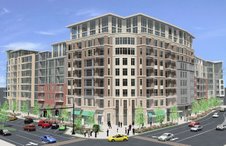Today, people are starting to look at downtown living in a new and affordable way. Among other benefits, including the convenience of being close to work and entertainment, and the health aspects of a walkable neighborhood, residents are embracing the ways that city life can help save money and build futures.
This three-part blog series will examine the economical aspects of urban living.
The following article from the Fresh Greens blog by US News and World report writer Maura Judkis, explores affordability of downtown living with housing and transportation costs set against percentage of household income. Check out the full article and access the affordability index tool by clicking on the links below.
City Mouse, Country Mouse: Who Spends More?
By Maura Judkis, Aug. 20, 2008
For decades, people have chosen life in the 'burbs because of the lower cost of housing, the extra space, and the family-friendly atmosphere. Gas prices, however, could change everything about suburban life—and a great tool that analyzes the true cost of suburban living can show us how...
...The Center for Neighborhood Technology, Brookings Institution, and Center for Transit-Oriented Development have come up with an affordability index that maps the true cost of suburban life vs. urban life by combining census data about income, housing, and transportation. The index found that city living, which many people consider to be too expensive, can actually be more economical than life in the suburbs.Said Maria Stamas of the Rocky Mountain Institute: "Among the findings, people who live close to transit, jobs, schools, and retail—typically in cities and inner-ring suburbs—spend up to $2,100 less per annum on gasoline than residents of outer-ring suburbs."...
CLICK HERE FOR FULL ARTICLECLICK HERE TO ACCESS HOUSING + TRANSPORTATION AFFORDABILITY INDEX



